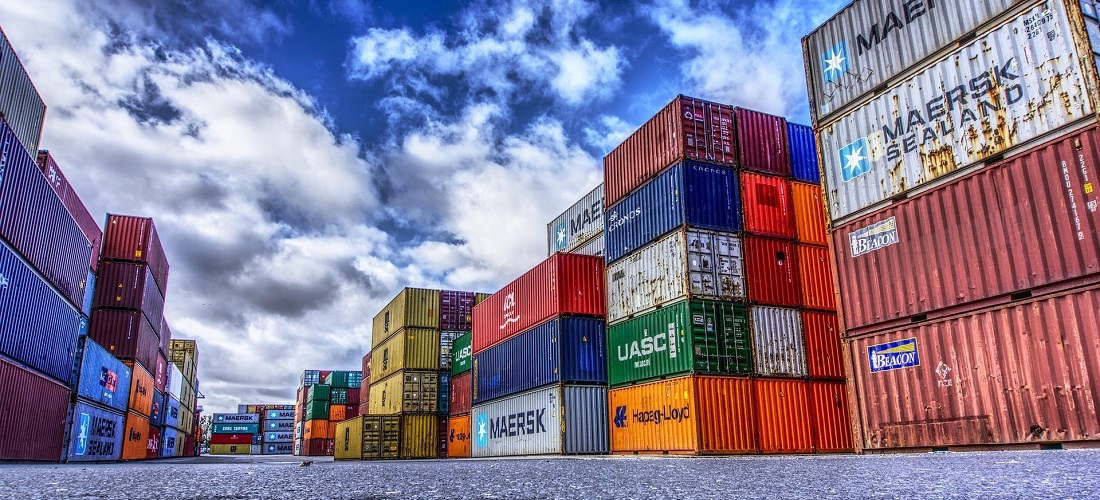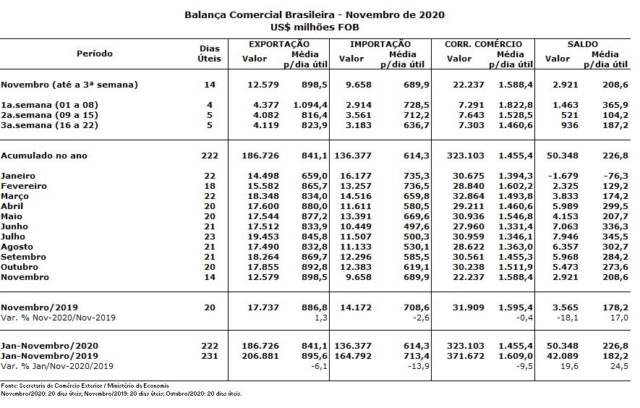
Brazilian trade balance registers US$ 936m surplus in 3rd week of November
Nov, 23, 2020 Posted by Ruth HollardWeek 202048
In the third week of November, the Brazilian trade balance registered a surplus of US$ 936 million and a trade flow of U $ 7.30 billion, according to data released by the Foreign Trade Secretariat (SECEX) of the Ministry of Economy. Exports over the period were valued at US$ 4.12 billion and imports were valued at US$ 3.18 billion. Year to date exports totaled US$ 186.73 billion and imports totaled US$ 136.38 billion, with a positive balance of US$ 50.35 billion and a trade flow of US$ 323.10 billion.
Analysis of the month
Comparing the exports daily average until the third week of November 2020 (US$ 898.48 million) with that of November 2019 (US$ 886.84 million), exports increased by 1.3% due to the increased sales of products from the Extractive Industry (+ 23.7%). On the other hand, there was a drop in sales in the Agriculture and Livestock Industry (-15.0%) and in the Manufacturing Industry (-0.1%).
The growth in exports was driven mainly by the increase in sales of the following products from the Extractive Industry: Iron ore and concentrates (+ 41.3%); copper ores and concentrates (+ 77.6%); and other crude minerals (+ 59.5%).
In imports, the daily average until the third week of November 2020 (US$ 689.87 million) was 2.6% below the average of November last year (US$ 708.61 million). In this comparison, expenses increased, mainly with Agriculture (+ 6.8%). On the other hand, there was a decrease in spending on purchases of products from the Manufacturing Industry (-0.1%) and with the Extractive Industry (-45.3%).
The fall in imports was mainly driven by the reduction in spending on the purchase of the following products from the Manufacturing Industry: petroleum fuel oils or bituminous minerals, except crude oils (- 59.5%); iron or steelworks and other base metal articles (-45.6%); aircraft and other equipment, including parts (-54.1%); taps, valves and similar devices for plumbing, boilers, reservoirs, vats and other containers (-41.3%); and motor vehicles for the transport of goods and special uses (-34.1%).
In relation to the Extractive Industry, the fall in imports was mainly driven by the decrease in spending on the following products: crude petroleum or bituminous mineral oils, raw (-59.1%); natural gas, liquefied or not (-42.0%); coal, even in powder, but not agglomerated (-22.8%); other base metal ores and concentrates (-65.6%); and iron ore and concentrates (-99.9%).
-
Steel and Aluminium
Dec, 27, 2018
0
Salvador Port receives its first-ever steel coils shipment via cabotage
-
Ports and Terminals
Mar, 14, 2024
0
Brazil: Porto Alegre records the best operational two months in its history
-
Dec, 26, 2023
0
Brazil Braces for Record Amount of Russian Diesel This Month
-
Ports and Terminals
Jun, 14, 2021
0
CODEBA sets record for the ninth consecutive month



